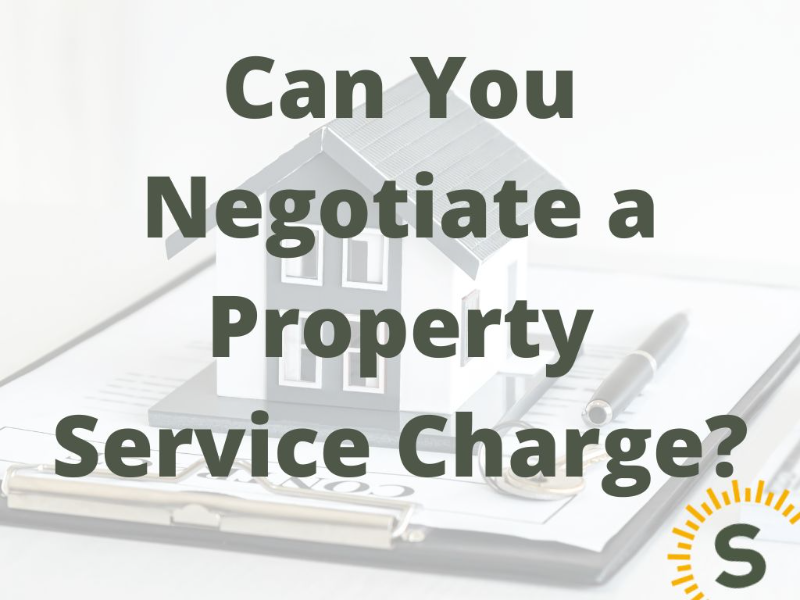
If you're a homeowner or a landlord, you're probably familiar with the term "service charge." This is a fee that is charged by property management companies or landlords to cover the costs of maintaining and managing the property. It can include things like landscaping, security, cleaning, and general upkeep. While service charges are a necessary part of property ownership, they can also be a significant expense. If you're looking to reduce your costs, you may be wondering if it's possible to negotiate your service charge.
In this insight, we'll explore some tips and strategies for negotiating your property service charge, so you can save money and ensure that you're getting the best value for your investment.
Yes, you can negotiate a property service charge. However, it's not always easy, and there are several factors that can affect your ability to negotiate. The best time to negotiate is before you buy your leasehold.
Here are some of the most important factors to consider:
If you're a tenant, your ability to negotiate your service charge may be limited by your lease agreement. Review your lease carefully to understand your rights and obligations.
The property management company or landlord: Some property management companies or landlords may be more willing to negotiate than others. It's important to do your research and understand the company's or landlord's policies before you begin negotiations.
The market conditions in your area can also affect your ability to negotiate. If there is high demand for rental properties in your area, property management companies and landlords may be less likely to negotiate as they could easily find another leaseholder willing to pay to the full charge.
Finally, your ability to negotiate effectively will also play a role in your success. It's important to come to the negotiation table prepared and with a clear understanding of what you want to achieve.
Your contribution to the Service charge can be based on the size of your apartment. If you have a larger apartment compared to the rest of the block, you may have to pay more. However, all apartments pay an equal amount, it is unlikely that you will be able to negotiate your service charge as that could lead to a possible dispute with the other leaseholders.
Before we dive into the specifics of negotiating a property service charge, it's important to understand what it is and what it covers. A service charge is a fee that is paid by tenants or homeowners to cover the cost of maintaining and managing the property. It typically includes things like cleaning, landscaping, maintenance, and general upkeep. The amount of the service charge varies depending on the property and the services provided.
Service charges are an important part of property ownership because they ensure that the property is well-maintained and that tenants have access to necessary services. However, they can also be a significant expense. As a homeowner or landlord, it's important to understand the components of the service charge and how they are calculated.
A property service charge typically includes several components. Here are some of the most common:
When negotiating a property service charge, there are several factors to consider that can affect your success. Here are some of the most important:
If you have a history of paying your rent and ground rent on time and taking good care of the property, you may be more likely to negotiate successfully.
If the property is in need of repairs or maintenance, you may have more leverage to negotiate.
Your relationship with the property management company or landlord: If you have a good relationship with the property management company or landlord, they may be more willing to negotiate with you.
As mentioned earlier, the current market conditions in your area can also affect your ability to negotiate.
Negotiating a property service charge can be challenging, but there are several tips that can help you succeed. Here are some of the most important:
When negotiating a property service charge, there are several common mistakes that you should avoid. Here are some of the most important:
Negotiating a property service charge can be a challenging process, but with the right approach, it is possible to save money and ensure that you're getting the best value for your investment. By understanding the components of the service charge, the factors that affect negotiation, and the tips and strategies for success, you can navigate this process with confidence and achieve your goals. Remember, it's important to be prepared, professional, and willing to compromise, and to seek professional help if necessary.
Read more: What Is A Reasonable Service Charge?

Stuart is an expert in Property, Money, Banking & Finance, having worked in retail and investment banking for 10+ years before founding Sunny Avenue. Stuart has spent his career studying finance. He holds qualifications in financial studies, mortgage advice & practice, banking operations, dealing & financial markets, derivatives, securities & investments.
 No minimum
No minimum  Newcastle-under-Lyme, Staffordshire
Newcastle-under-Lyme, Staffordshire Free Consultations
Free Consultations
 No minimum
No minimum  Free Consultations
Free Consultations
 No minimum
No minimum  No obligation consultation
No obligation consultation
 No minimum
No minimum  Leyland, Lancashire
Leyland, Lancashire No obligation consultation
No obligation consultation
 No minimum
No minimum  No obligation consultation
No obligation consultation
 No minimum
No minimum  Free Consultations
Free Consultations
 No minimum
No minimum  No obligation consultation
No obligation consultation
 No minimum
No minimum  No obligation consultation
No obligation consultation
 No minimum
No minimum  Free Consultations
Free Consultations
 No minimum
No minimum  Free Consultations
Free Consultations
 No minimum
No minimum  Coatbridge, Lanarkshire
Coatbridge, Lanarkshire Initial or Ongoing Consultation Fees
Initial or Ongoing Consultation Fees
 No minimum
No minimum  Initial or Ongoing Consultation Fees
Initial or Ongoing Consultation Fees
 £21,000 +
£21,000 +  Initial fee free consultation
Initial fee free consultation
 London, Greater London
London, Greater London No obligation consultation
No obligation consultation
 No minimum
No minimum  Initial fee free consultation
Initial fee free consultation
 No minimum
No minimum  No obligation consultation
No obligation consultation
 No minimum
No minimum  No obligation consultation
No obligation consultation
 No minimum
No minimum  No obligation consultation
No obligation consultation
 No minimum
No minimum  Initial fee free consultation
Initial fee free consultation
 No minimum
No minimum  No obligation consultation
No obligation consultation
 No minimum
No minimum  Initial fee free consultation
Initial fee free consultation
 No minimum
No minimum  Initial or Ongoing Consultation Fees
Initial or Ongoing Consultation Fees
 No minimum
No minimum  Initial fee free consultation
Initial fee free consultation
 No minimum
No minimum  Free Consultations
Free Consultations
 £51,000+
£51,000+  Sheffield, South Yorkshire
Sheffield, South Yorkshire No obligation consultation
No obligation consultation





Our website offers information about financial products such as investing, savings, equity release, mortgages, and insurance. None of the information on Sunny Avenue constitutes personal advice. Sunny Avenue does not offer any of these services directly and we only act as a directory service to connect you to the experts. If you require further information to proceed you will need to request advice, for example from the financial advisers listed. If you decide to invest, read the important investment notes provided first, decide how to proceed on your own basis, and remember that investments can go up and down in value, so you could get back less than you put in.
Think carefully before securing debts against your home. A mortgage is a loan secured on your home, which you could lose if you do not keep up your mortgage payments. Check that any mortgage will meet your needs if you want to move or sell your home or you want your family to inherit it. If you are in any doubt, seek independent advice.